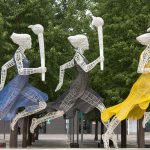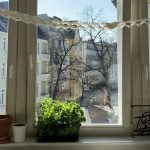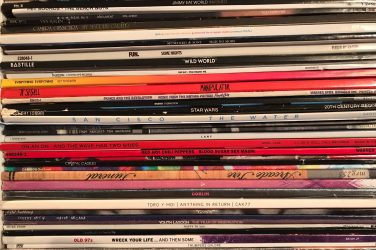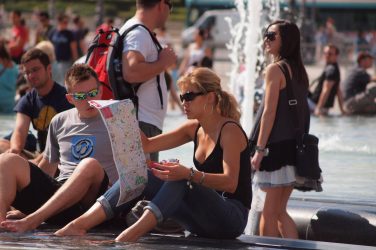After having seen a shrine for lost relationships in a public park, E&M‘s Friederike Sandow goes on a stroll through the remnants of lost relationships. What stays behind when people leave? Where do people go to mourn? And what do you do if the things left behind inflict pain but yet hold memories?
The different life stages of a toothbrush
I remember staring at the red toothbrush, next to mine, with its little plastic straws on the outside a little bent, from having used a bit too much force from brushing against their teeth. What was I supposed to do with this? The easy and most logical answer would be to throw it out. It’s not mine and they won’t be using it anymore. But throwing it away felt cruel. Final. But leaving it felt silly, and looking at it caused pain. Something about throwing the toothbrush away, this mundane everyday hygienic item we all have and (hopefully) replace regularly can mean the end of the world, when once it meant the start of something new and exciting.
A few weeks ago I stumbled upon a post on reddit on r/berlin:

And there, can you see it? The little green toothbrush on the left side. Someone else also didn’t know what do with this item that once meant nothing but practicality and is now an emblem of pain for the person who left it at this impromptu shrine.
The post-break ache
When two people break up, whether it’s amicably, a long-time coming, sad, for the better, a breakthrough, a lifesaver, the last straw, just not meant to be, or devastating, it’s never easy and mostly always shit. People deal with it in different ways – you have the ‘march-on’ers, the ‘wallowers’, the ‘to-do-list’ers, the ‘I pretend nothing’s different’ers and the ‘it wasn’t even a real relationship just a fling’ers.
I always used to think that people who never had their heart broken should count themselves lucky. Nowadays, I am not so sure anymore. I think back to my heartbreaks and I count myself lucky. Of course for soppy reasons such as ’tis better to have loved and lost than never to have loved at all‘ but also for the raw focus that truly devastating heartbreak (from my perspective, I am very very sure people have suffered beyond what I have had to experience) has given me: a focus onto who I am as a person, and who I surround myself with – my friends, my family, my books, myself.
What I found, not only in my aches but also in my friends’ and family members’, is that what makes heartbreak so unbearable are the same little things that make love so incredibly intimate at its beginning. Did you know that the butterflies you sometimes feel in the pit of your stomach at the beginning of a date or before the first kiss are the same kind of butterflies that you feel in the pit of your empty stomach when your heart has been broken?
Some people wallow, some people march on. Some people need to cry it out, some people need to never speak of it again. Independently of how we all deal with hurt, it’s the loss that stings. A loss of a confidant, a friend, or your once-favourite person, a loss of an imagined future together. A loss of their friends and family. A loss of their room, their flat, their smell, their TV, their books you always wanted to borrow, their favourite mug, their plants, their shower curtain, their too-loud laugh, the way they were holding on to your earlobe for support on public transport. Whether you end it on good terms or not, decided to stay friends or not, ultimately, you need to deal with a loss of something, someone, in some form or shape. You will mourn without a body to be mourned, you’ll mourn something that is intangible, and yet not fictitious, because you remember what you once felt.
The museum of broken relationships
In Los Angeles, USA, and in Zagreb, Croatia, you can visit The Museum of Broken Relationships. It is similar to what people felt the need to do on Tempelhofer Feld, Berlin. “[It] is a global crowd-sourced project with permanent museum outposts in LA and Zagreb. The ongoing travelling exhibitions have been the source of growth, variety and originality (…)”. Whoever feels the need to have a place to tell their story, their heartbreak, can do so virtually. Scrolling through the posts of what people have defined as their emblem of lost love is so very sweet, heartbreaking, sad, funny, and, admittedly, a little odd:



It shows how different people mourn, if they’re angry, sad or just want to commemorate – to not forget. Maybe they just wanted to share, relate to others, feel heard in a sea of other broken hearts. It shows as well how the time you’ve been in a relationship is not necessary in direct relation of how sad you might feel of having lost it – or the idea of what could have been.
The three endings which all mean the same
- I threw the toothbrush out. But for weeks I saw it out of the corner of my eyes, even though it wasn’t there anymore. I still know what it looked like, years later. Turns out, I didn’t have to keep it to remember everything.
- I went looking for “the shrine for all of the relationships that did not survive lockdown” on Tempelhofer Feld in Berlin – and I found it. It’s not really a shrine anymore – it, funnily enough, didn’t survive lockdown either.

Photo by Friederike Sandow
3. I have tried, I really have, but I cannot not end without leaving you with this scene from the peach-scented movie and book „Call me by your name“ and yes, I know, I am a class A millennial. But it just makes me so very sad and so very hopeful at the same time. Let me have this.
“Right now you may not want to feel anything. Maybe you never wanted to feel anything and maybe it’s not me you want to speak about these things but feel something you obviously did. Look you had a beautiful friendship, maybe more than a friendship. And I envy you. In my place, most parents would hope the whole thing goes away, or pray that their sons land on their feet soon enough. But I am not such a parent. We rip out so much of ourselves to be cured of things faster than we should that we go bankrupt by the age of 30 and have less to offer each time we start with someone new. But to feel nothing so as not to feel anything—what a waste! (…) Right now there’s sorrow, pain – don’t kill it, and with it, the joy you felt.”
(André Aciman, Call me by your name).
Cover Photo by: u/SergiySev on reddit.com/r/berlin










